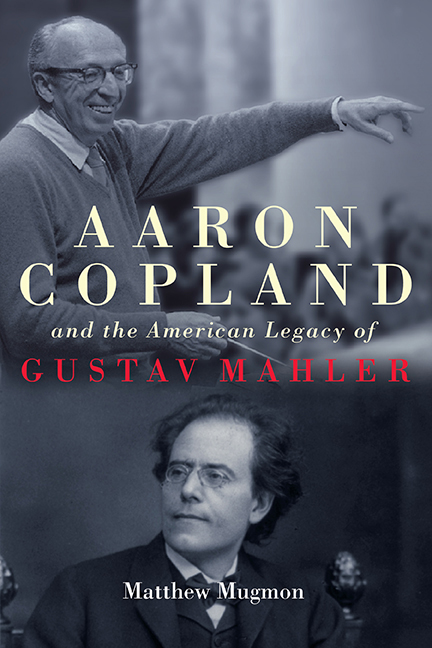Book contents
- Frontmatter
- Dedication
- Contents
- Acknowledgments
- Note on Musical Examples
- Introduction
- 1 Mahler and Copland in New York
- 2 Mahler in Nadia Boulanger's Studio and Beyond
- 3 Copland in Defense of Mahler
- 4 Mahler in Copland's Jewish Romanticism
- 5 Mahler's Idiom in Copland's “American” Sound
- 6 Copland, Koussevitzky, Mahler, and the Canon
- 7 Copland's Role in Bernstein's Mahler Advocacy
- Conclusion
- Notes
- Bibliography
- Index
- Eastman Studies in Music
6 - Copland, Koussevitzky, Mahler, and the Canon
Published online by Cambridge University Press: 18 September 2019
- Frontmatter
- Dedication
- Contents
- Acknowledgments
- Note on Musical Examples
- Introduction
- 1 Mahler and Copland in New York
- 2 Mahler in Nadia Boulanger's Studio and Beyond
- 3 Copland in Defense of Mahler
- 4 Mahler in Copland's Jewish Romanticism
- 5 Mahler's Idiom in Copland's “American” Sound
- 6 Copland, Koussevitzky, Mahler, and the Canon
- 7 Copland's Role in Bernstein's Mahler Advocacy
- Conclusion
- Notes
- Bibliography
- Index
- Eastman Studies in Music
Summary
Although New York is the American locale most closely identified with Gustav Mahler, the city of Boston played a crucial role in broadening his impact in the United States. During his time in New York that began in 1907, Mahler—by then a famous conductor and composer—nearly moved north to become conductor of the Boston Symphony Orchestra, whose founder, Henry Lee Higginson, seems to have recruited him and even offered him a position in 1908. Mahler also conducted the Metropolitan Opera (in 1908) and the New York Philharmonic (in 1910) in Boston. He did not perform his own music in Boston on those trips, but even before Mahler's arrival in the United States, audiences in Boston had some opportunities to hear his music. In February of 1906, the conductor Wilhelm Gericke led the Boston Symphony Orchestra in the first performances of Mahler's Fifth Symphony on the East Coast, performing it in Boston and on tour in New York, Philadelphia, and Baltimore. During this tour, what was perhaps the first performance of the Adagietto as a stand-alone movement was heard in Baltimore on February 14, 1906. (The first performance of the Adagietto detached from the other movements was previously thought to have occurred on April 1, 1906, with Mengelberg conducting the Royal Concertgebouw Orchestra.)
Despite these inroads, Mahler's music did not find a firm place in Boston's repertory after the first years of the twentieth century. That city's most important Mahler champion after his death was the German conductor Karl Muck, who conducted the Fifth Symphony in 1913 and 1914 and the Second Symphony in 1918—the only times the BSO performed Mahler symphonies in that decade. In New York, as we saw above, the public presence of Mahler's music blossomed, with Willem Mengelberg conducting Mahler symphonies for New York audiences regularly from 1921 onward. But in Boston, Mahler remained absent from the BSO's programs. With the exceptions of Pierre Monteux's 1923 performances of Mahler's First Symphony and a selection of songs from Des Knaben Wunderhorn in 1924, the BSO did not perform Mahler's music between 1918 and 1927.
Mahler reappeared on the Symphony Hall stage during the tenure of the Russian-born, internationally renowned conductor and doublebass virtuoso Serge Koussevitzky.
- Type
- Chapter
- Information
- Aaron Copland and the American Legacy of Gustav Mahler , pp. 114 - 139Publisher: Boydell & BrewerPrint publication year: 2019



